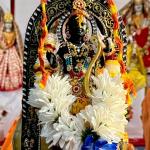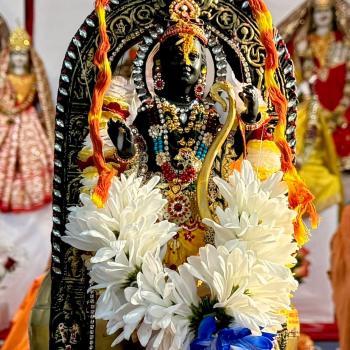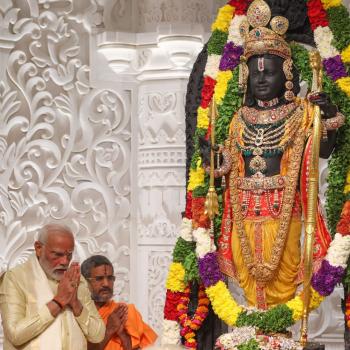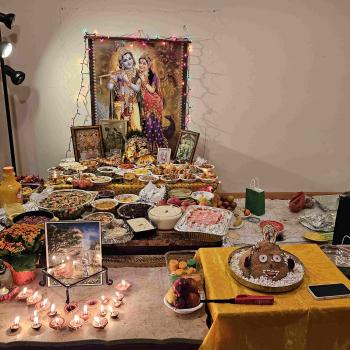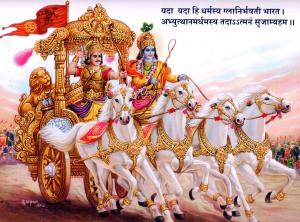
While it may not always be apparent, I suspect that religious practices and beliefs hold significance for many of today’s Olympians, just as they did when the Olympics were first established. This article focuses on Manu Bhaker, an athlete from India (also known as Bharat). A 22-year-old Bhaker made history at the Paris Olympics by winning two Bronze medals and narrowly missing a third. In the present context, she deserves recognition for connecting the dots between her deep spiritual connection with the Bhagavad Gita (commonly called the Gita) and her success. She is the first Indian woman to win a shooting medal at the Summer Games in Paris.
The Bhagavad Gita remains one of the most treasured jewels of Bharat’s religious scriptures, identity, cultural heritage, and Dharmic themes deeply embedded in the national psyche. This article discusses Bhaker’s journey of spirituality, influenced by the teachings on Karma narrated by Bhagwan Krishna to his disciple and friend Arjun amid the Mahabharata.
It is believed that when Arjun was conflicted about whether he should continue to fight, Bhagwan Krishna expounded on the Gita. It is a treasure trove of Sanatan teachings, including Karma Yoga. The iconic chariot scene (shown above) depicts Bhagwan Krishna and Arjun in a war zone in Mahabharat.
What follows here is Bhaker’s deep religious connection with the Gita and a brief history of the Olympics and its association with religion.
Manu Bhaker and the Gita
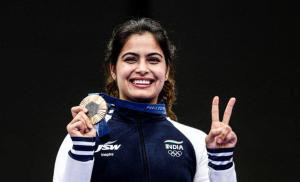
After winning her first Bronze medal in Paris, Bhaker credited her success to reading the Bhagavad Gita. In an Instagram story, she shared, “Mental fortitude in high-pressure competitions is something that I focused on.” She explained how the teachings of the Bhagavad Gita helped her develop a calm and focused mindset, enabling her to perform at her best under immense pressure.
“I read a lot of the Gita. As Lord Krishna says, ‘Focus on karma, not on the outcome of the karma.’ That’s what I did… I thought, ‘Do your thing and let it all be,'” she told Jio Cinema after winning her medal.

Bhaker was inspired by the teachings on “Karma Yoga” or “The Yoga of Action” in the third chapter of the Bhagavad Gita. In this chapter, Lord Krishna emphasizes the importance of karma in life and describes actions that lead to bondage and liberation. He teaches that people should perform their duties for the pleasure of the Supreme (Krishna himself was the incarnation of the Supreme). His teachings suggest that Karma should be done as a matter of duty without being attached to the rewards and the fruits of their actions.
One of the profound teachings in the Gita that many of us are taught to follow as we grow up is as follows:
कर्मण्येवाधिकारस्ते मा फलेषु कदाचन।
मा कर्मफलहेतु र्भूर्मा ते संगोस्त्वकर्मणि।।
English Meaning: Lord Krishna to Arjun – O Partha (another name for Arjun)! It is your right to work. You have no right to the fruits of your actions. Therefore, keep doing your work without worrying about the results.
Bhaker’s journey
Bhaker’s journey to becoming an Olympic competitor and medalist is similar to that of many athletes globally. However, one significant difference is that Bharat has not been a major participating country in the Olympics. Only in the last couple of decades have Bharat’s athletes participated in the Olympics in greater numbers. As Bharat’s economic prowess has risen there is a sharper focus on sports beyond the national pastime of Cricket. Today’s Bharat is heavily promoting many sports, identifying talent, building appropriate facilities, and training athletes for global competitions.
Bhaker is just one example of Bharat’s pride and success story. Her academic credentials including an Honors degree in Political Science from Lady Shri Ram College, University of Delhi, are as impressive as her athletic career. While preparing for the Paris Olympics, she is also pursuing a degree in Public Administration from Punjab University.
Bhaker’s Accomplishments: Her accolades in sports include being the 2018 Flagbearer at the Opening of the Youth Olympic Games in Buenos Aires, Argentina. She received the Best Young Athlete Award in 2019. Subsequently, she got the Arjuna Award from the Ministry of Youth Affairs and Sports in 2020. Her hobbies include music, reading, painting, sketching, dancing, horse riding, and finally shooting with two Medals to her credit.
As an Olympian representing Bharat at the Tokyo 2021 Olympics, Bhaker faced a distressing performance due to a malfunction in her pistol. However, she overcame that setback. “After Tokyo, I was very disappointed. It took me a long time to get over that,” she shared in an interview. Bhaker channeled her mental toughness and spiritual practices to overcome challenges, drawing solace from reading the Bhagavad Gita and focusing on doing her best while leaving the rest to destiny.
Her prayers, patience, and perseverance paid off. She won not just one but two Bronze medals at the Paris Olympics. Nothing should stop Bhaker from competing in the 2028 Olympics and securing what every athlete hopes for—the glittering Gold medal.
Bhaker has openly credited her strength and turnaround from the Tokyo Olympics to the teachings of the Gita. There are many more athletes in Bharat who pray to God before, during, and after their games. Generally, we the Hindus thank God even if we do not achieve our aspirations or fail in our attempts. In Bhaker’s case, the Gita was a medium to express her devotion to Bhagwan Krishna, credit her spirituality for a historical victory, and make Bharat proud.
Olympics and Religion
Historically, “Every fourth year between 776 B.C.E. and 395 C.E., the Olympic Games, held in honor of the god Zeus, the supreme god of Greek mythology, attracted people from across Greece.” This quote from the Olympic Games highlights the connection between the god Zeus and the Olympics as early as 776 B.C.E. Fast forwarding to today, a recent article mentions many athletes with religious beliefs.
Reportedly, athletes with faith in The Church of Jesus Christ of Latter-day Saints turn to God for help as they strive to make the most of their Olympic opportunities. For example, Courtney Wayment told the Deseret News, “Anything that I’ve accomplished in life or on the track has come from God’s tender mercies and His love for me.”
Other examples from Team USA include runner Sydney McLaughlin-Levrone, swimmer Caeleb Dressel, and gymnast Brody Malone. They speak regularly about leaning on their faith as they chase their Olympic dreams.
In conclusion, most people, irrespective of religious affiliations, turn to their faith in times of stress and triumph. Some do so discreetly while others are more open about it. Athletes are people too. Accordingly, Christian athletes likely go to a church or seek blessings from Jesus. Likewise, athletes of the Islamic faith go to the mosque and Hindu athletes visit the mandir. They pray to Allah and Bhagwan, respectively.


